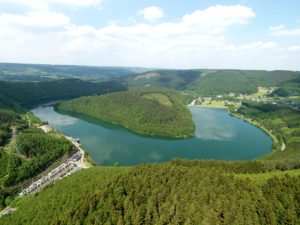Xylem Supplies Cutting-Edge Pump Technology as Part of Major Lock Expansion Project to Increase Connectivity Between Northern and Southern Europe
Xylem has designed a state-of-the-art water pumping solution as part of a complex project to expand the Lanaye Locks in Belgium, a vital connector route between Northern and Southern Europe.
Xylem’s Flygt pumps and turbines will regulate water levels in the canal network and harness energy from excess water in the Albert Canal. The addition of a fourth Lanaye lock (225 metres (m) x 25m) will quadruple the lock system’s convoy capacity from 2,000 to 9,000 tons. The new lock was officially opened by His Majesty King Philippe of Belgium recently.
Located on the Belgium Netherlands’ border, the Lanaye Locks link the Albert and Juliana Canals; the latter, a side canal of the River Meuse. Three locks have operated alongside each other since 1964 but, as two of these are too narrow to accommodate even smaller convoy, the larger lock has, over time, become a serious bottle neck for canal traffic.
Xylem was commissioned by the project consortium, BESIX Sanotec-Balteau, to develop a compact solution to address challenges associated with seasonal water level changes in the lock. Xylem’s solution, which includes five Flygt 500 kilowatt (kW) submersible hydroturbines with a flow of 18 cubic metres per second (m³/s), pumps water back into the Albert canal, maintaining adequate levels to accommodate canal traffic during dry weather spells.
For most of the year, high water levels in Northern Europe require that water in the canal network be directed towards the Netherlands, where it flows into the sea. A major objective of the lock project was to recover some of the lost energy associated with this process. Xylem delivered five Flygt turbines each with an output of 460 kilowatts (kW) to harness energy and ensure minimal losses. Energy generated by the turbines flows into the electrical network.
Daniel Van de Gucht, EMEA Key Account Manager, Public Utilities for Xylem, said, “Inflow conditions in the turbines must be carefully regulated in order to avoid disruption to canal traffic in the main channel. Turbulence in the system can also result in energy losses and reduce the lifetime of the turbines. Xylem developed a bespoke solution based on a reduced pipe network which ensures a perfectly balanced flow and minimal energy losses, with consequent lower energy consumption by pumps while generating power through the turbines. The reduced pipe network also means fewer components are subject to wear which increases the lifespan of the turbines.
Patrick Delperdange, Senior Operations Manager BESIX Civil Works, commented, “The construction of the fourth Lanaye lock is one of the largest civil engineering projects of the decade in Wallonia. The works required the on-site production of over 220,000 cubic metres (m³) of concrete, mainly made of the gravels extracted from the river Meuse during the earthworks of 1,300,000 m³ (cut and fill). The concrete was reinforced with 15,000 tons of steel and required 200,000 square metres (m²) of formwork. BESIX finished this ambitious project within the agreed timeframe, while also coordinating the electromechanical works, among them the realisation of the hydroelectric power and pumping plant.”
Adrien Theunissen, Senior Manager BESIX Sanotec added, “Thanks to the engineering capabilities of BESIX Sanotec, CMI Balteau and Xylem, we could propose an alternative to the original scheme which was very attractive for the client. This resulted in enhanced efficiency and a reduction in construction and maintenance costs. The synergy between the partners contributed to a fruitful cooperation at all stages of the project.”
Source: Xylem Inc.


